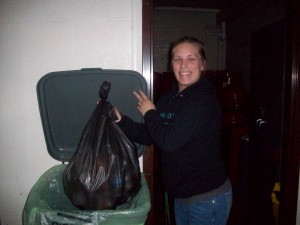
Sophomore Veronica Lathroum practices good recycling habits.
Caitlin Roetheli
Contributor
I grew up in a household where my mother was very adamant about recycling. All plastic, paper, metal, and glass was sorted and then recycled. My mother would go out of her way to bring home recyclables from places where recycling wasn’t available and would make monthly pilgrimages to the nearest recycling center, an hour from our house. The idea of recycling was drilled into my head from such a young age that it has become second nature.
So I was surprised when I came to college, where recycling has been made so accessible, that people still aren’t doing it. Recycling receptacles have been placed in most residence halls, academic buildings, and meeting places as a result of efforts in past years by the college’s Envrionmental Action Club (EAC) and participation in Recyclemania. In most places where a student has an option to throw something away, they also have the option to recycle it, or a recycling receptacle is only a few feet away. And yet, I still see people throwing away plastic water bottles and aluminum soda cans in regular trash cans along with uneaten food and used tissues.
McDaniel College has made an obvious effort to become more environmentally sustainable. According to the McDaniel website, in May 2007, President Joan Coley signed the American College and University President’s Climate Commitment and our participation in the National Recycling Coalition’s Recyclemania in 2008 led to 26,430 pounds of paper, cardboard, bottles and cans to be recycled over ten weeks. That’s about 14.13 pounds per person. However, we still only placed 36th out of 59 schools on a per capita scale. Our participation in the program the following year totaled 12.65 pounds per person over ten weeks, as stated on the McDaniel Recyclemania website, showing a decline in recycling across campus.
It’s not like there is even that much effort put into actually recycling something besides just the idea of ”oh, this is recyclable.” The school’s recycling is single-stream, meaning everything recyclable is thrown in together, and then sorted later by the collection company. No physical act of sorting papers from plastics from metals has to take place by the student. Everything just has to be placed into one recycling receptacle. All it takes to be a recycler is to have two trash cans, one for trash and one for recyclables, instead of just one. Is it that hard? McDaniel College’s 2009 Climate Action Plan states “the college’s participation in Recyclemania creates a culture where it is the social norm to recycle. With a healthy dose of competition, and lots of signs around campus, students are realizing what they throw away does matter, and what we recycle matters even more.” We need to become aware of our waste and make good habits the norm for us now before the bad habits stick.
The college itself benefits from recycling too. The 2009 Climate Action Plan concludes that by reducing 7% of waste a year by recycling, which would equal about a 74 ton decrease, they would then have a return of $5,200 a year after an initial $2,700 investment the first year. That’s 5,200 more dollars that could go toward student programs, academics, scholarships, campus improvements, or better food. So something as simple as placing your trash in a different container could result in more money for the school and you.
Recycling is one of the easiest and most accessible ways to make a noticeable impact on the environment, by allowing our materials to be reused later on so we don’t need to harvest as many new materials in the future. McDaniel College makes recycling easy for us, the college community. Why shouldn’t we make the small effort now, while its free and convenient, so that we can create good habits within ourselves that become second nature later on? Then it won’t seem like such a hassle and we’ll want to recycle and be more willing to make the effort. Recycling counts, so let’s do it.

